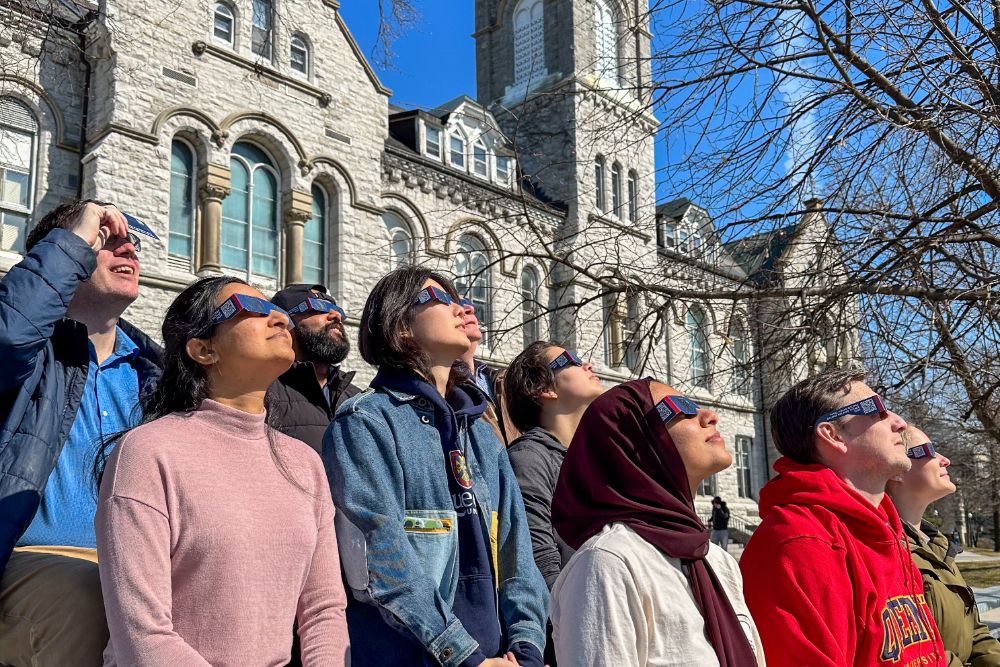
Glasses will be available on campus beginning March 25.
Queen’s distributes solar eclipse glasses to community
To ensure members of the campus and Kingston community can view the upcoming total solar eclipse safely and effectively, Queen’s will distribute 120,000 certified eclipse glasses to these groups. The Queen’s-branded glasses are being provided at no cost, as part of the university’s educational and science outreach activity celebrating this rare celestial event.
Beginning Monday, March 25, certified eclipse glasses will be available on campus to members of the Queen’s community (staff, faculty, and students) and distributed on a one-per-person basis. Students residing in Queen’s University residences will have access to glasses through their resident dons.
The Department of Physics, Engineering Physics & Astronomy has also partnered with Kingston Frontenac Public Library to offer free glasses to local community members through the library branches.
Elementary and high school staff and students in Kingston will have access to Queen’s eclipse glasses through their respective school boards, including the Limestone District School Board, Algonquin & Lakeshore Catholic District School Board, and local private schools. The Department of Physics is leading local community outreach around the eclipse, aiming to provide education across 80 local schools, generate excitement, and outline safety measures as part of the eclipse ambassador program in the weeks leading up to April 8.
Eclipse glasses will be available at the following designated distribution points, ensuring widespread accessibility for the Queen’s and Kingston community.
Queen’s pick-up locations:
• Bracken Health Sciences Library - Botterell Hall, 18 Stuart Street
• Douglas Library, 93 University Avenue
• Duncan McArthur Hall, 511 Union Street
• Human Resources – Fleming Hall, Stewart Pollock Wing, 78 Fifth Field Company Lane
• Joseph S. Stauffer Library, 101 Union Street
• Student Life Centre – first floor of the Queen’s Centre, 284 Earl Street
• Student Wellness Services – Mitchell Hall, 69 Union Street
• The Miller Museum of Geology – Miller Hall, 36 Union Street
How to use the glasses:
To safely experience the upcoming total solar eclipse on April 8, 2024, it is imperative to adhere to recommended guidelines and take necessary precautions. Ensure your safety by using certified solar eclipse glasses that adhere to the ISO 12312-2:2015 safety standard when observing a solar eclipse. Directly looking at the Sun without adequate shielding can lead to permanent vision damage or blindness. Always put your glasses on before looking at the Sun. Once actively engaged in observing the eclipse, glasses must remain on.

The only exception to this rule is during the brief period of “totality” when the Moon completely blocks the Sun’s light for approximately three minutes. During full totality, it is safe to temporarily remove your eclipse glasses, but remember to put them back on before totality ends to continue observing safely. Always supervise children while they use solar viewing glasses or eclipse viewers. Parents should be aware that it is crucial to closely monitor children, ensuring that the glasses are securely and correctly positioned over their eyes.
If you are unsure about safety, it is recommended to attend an official eclipse event on April 8, 2024, led by qualified experts.
For more information, resources, and updates on community activities, including an educational brochure, please visit the Queen’s eclipse website.
Note: This article originally appeared in the Queen's Gazette.

